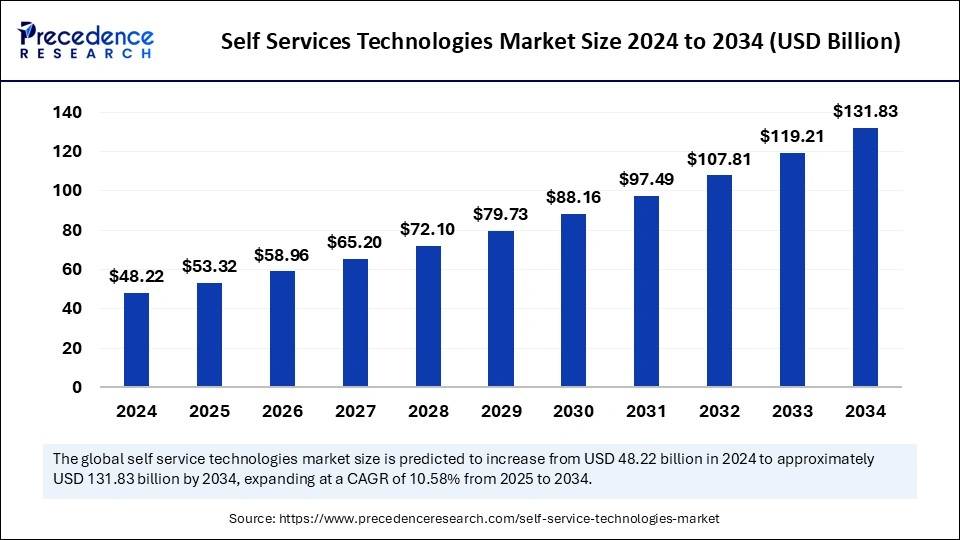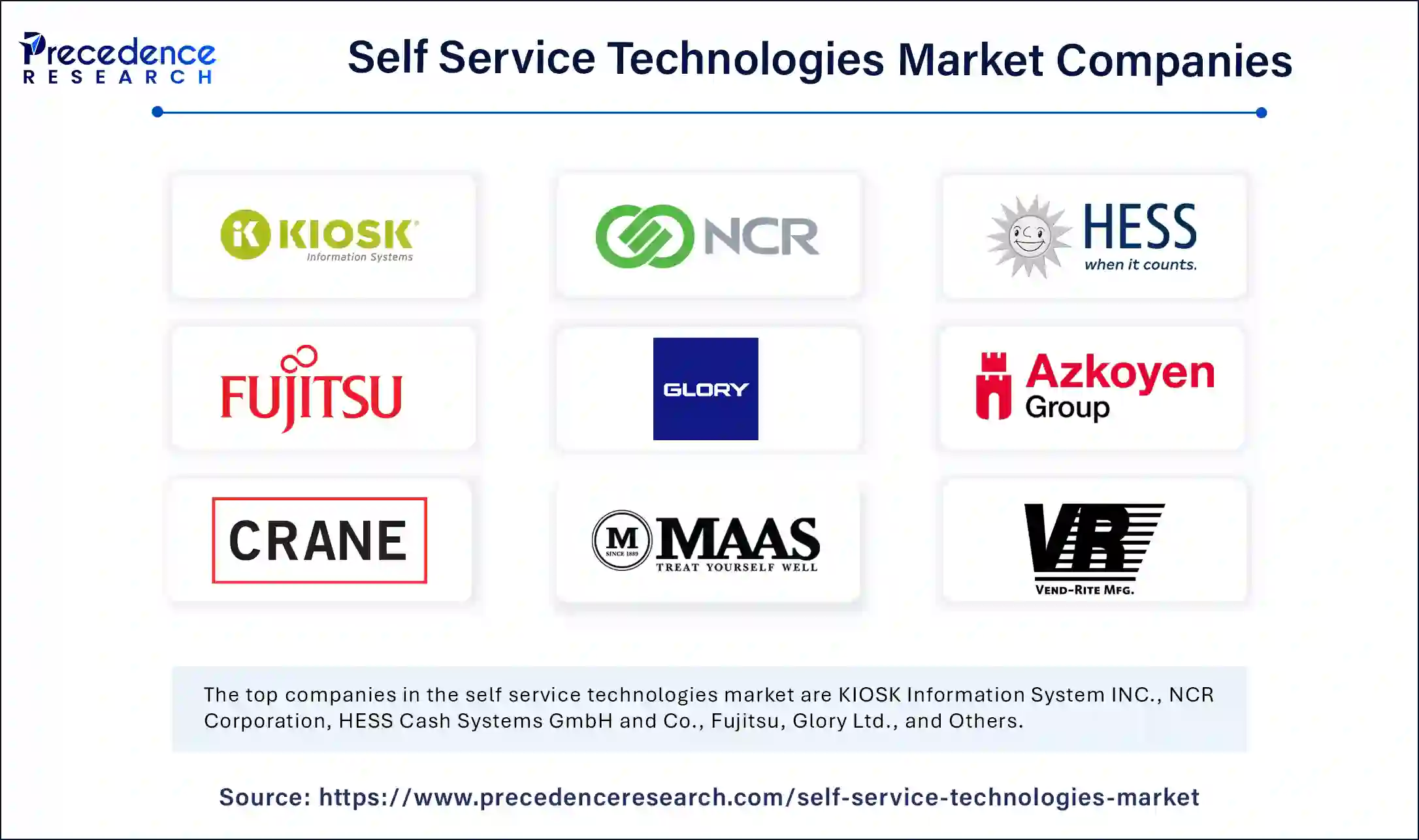April 2025
The global self service technologies market size is evaluated at USD 53.32 billion in 2025 and is forecasted to hit around USD 131.83 billion by 2034, growing at a notable CAGR of 10.58% from 2025 to 2034.The market sizing and forecasts are revenue-based (USD Million/Billion), with 2024 as the base year.
The global self service technologies market size was estimated at USD 48.22 billion in 2024 and is predicted to increase from USD 53.32 billion in 2025 to approximately USD 131.83 billion by 2034, expanding at a solid CAGR of 10.58% from 2025 to 2034. Extensive adoption of self service machines and automated devices is the key factor driving market growth. Also, numerous technological advancements like wireless communication coupled with the increasing adoption of connected systems and mobile devices can fuel market growth further.

Artificial Intelligence technology is transforming the way businesses offer customer self service solutions. By using AI technologies, companies in the self service technologies market can optimize their customer support processes, improve user experience, and enhance customer satisfaction. Furthermore, AI-driven Natural Language Processing technology allows customers to interact with this platform utilizing natural language, which makes it sophisticated for users to get personalized assistance.
The self service technologies market is anticipated to grow due to the many benefits it offers to both businesses and customers. Organizations are adopting technologies to enhance their service offerings across many sectors, such as banks, airports, restaurants, and hotels. This technology has transformed human intervention in tasks like food ordering, transactions, queue management, and billing statements. The increasing adoption of technology is the major factor impacting market growth positively.
| Report Coverage | Details |
| Market Size by 2034 | USD 131.83 Billion |
| Market Size in 2025 | USD 53.32 Billion |
| Market Size in 2024 | USD 48.22 Billion |
| Market Growth Rate from 2025 to 2034 | CAGR of 10.58% |
| Dominated Region | North America |
| Fastest Growing Market | Asia Pacific |
| Base Year | 2024 |
| Forecast Period | 2025 to 2034 |
| Segments Covered | End User, Type, and Regions |
| Regions Covered | North America, Europe, Asia-Pacific, Latin America, and Middle East & Africa |
Improved customer experience and engagement
The use of self service technologies market to enhance customer engagement and experience is the major factor driving market growth. These technologies give customers control over all their interactions, which leads to a more personalized and satisfying service experience. In addition, Interactive mobile application and kiosks offer consumers easy access to services and information. This convenience is useful in locations such as retail establishments, healthcare institutions, and airports.
Concerns regarding data security
The concerns about data privacy and security pose a major hurdle to the self service technologies market. Hence, market players need to take stringent precautions to protect client data and uphold confidence. Moreover, security threats like information hacking and skimming need to be decreased over time.
Rising consumer preference for speed and convenience
Consumers are focusing more on speed and convenience in service delivery, which is creating future opportunities for the self service technologies market. There has been a surge in a fast-paced lifestyle, which allows consumers to find solutions that provide hassle-free and quick services. Furthermore, consumers appreciate the capability to control their interactions and transactions, which helps decrease wait times and minimize their reliance on human assistance.
The ATM machine segment held the largest self service technologies market share in 2024. The dominance of the segment can be attributed to the increasing trend of technology up-gradation and automation. There is a growing need to decrease operational costs and increase consumer satisfaction. Additionally, the rising demand for small-value transactions among the majority of consumers across the globe is a key factor impacting segment growth positively.
The vending machine segment is anticipated to grow at the fastest rate over the forecast period. The growth of the segment can be credited to the increasing demand for vending machines in the corporate segment, along with the rising need for reduced space, queues, and overall costs. Also, the surging number of corporate offices and commercial projects that offer faster services will likely contribute to the market expansion further.
In 2024, the retail segment led the self service technologies market by holding the largest share. The dominance of the segment can be linked to the increasing need to offer quality service and enhanced consumer experience that encourages retailers to utilize self-service technologies. Furthermore, there is a rising adoption of self-checkout systems and interactive kiosks among many retail sectors, such as convenience stores, specialty stores, and supermarkets.
The quick service restaurant (QSR) segment is anticipated to grow at the fastest rate over the projected period. The growth of the segment can be driven by an increasing number of QSRs along with the surging consumer orders and the requirement to decrease the counter waiting time with fewer employees. However, the escalating competition among restaurants to offer sophisticated service while keeping operational costs low is a major factor boosting the segment's growth.
North America dominated the global self service technologies market in 2024. The dominance of the region can be attributed to the raised expenditure on self service technology solutions in Canada and the U.S. The extensive use of these technologies in kiosks, ATMs, and vending machines is further impacting positive market growth. Moreover, increasing urbanization in these countries, along with the sudden growth in the banking sector, has fuelled market growth in the region.
Asia Pacific is expected to grow at the fastest rate in the self service technologies market over the studied period. The growth of the region can be credited to the ongoing investments in self-service technologies among major economies, including Thailand, India, China, Japan, and Indonesia. Furthermore, the rising awareness and shifting consumer preferences towards this technology are anticipated to fuel the market demand in the region. Increasing urbanization across nations like China, India, and Japan can propel market growth shortly.

By Type
By End User
By Regions
For inquiries regarding discounts, bulk purchases, or customization requests, please contact us at sales@precedenceresearch.com
No cookie-cutter, only authentic analysis – take the 1st step to become a Precedence Research client
April 2025